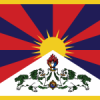
 The international "Flag for Tibet" campaign started in the mid-1990s in Western Europe and has become one of the most important symbolic actions in support of Tibet. The campaign takes place every year on 10 March, the anniversary of the Tibetan uprising against the Chinese occupation of Tibet. More than 80 000 Tibetans died in the 1959 uprising, and hundreds of thousands of Tibetans died in prisons, labour camps and famine in the following years. The campaign aims to highlight the long-standing human rights violations in Tibet. The Czech Republic has joined the campaign regularly since 1996, when the first four Czech cities raised the Tibetan flag. Last year, 867 municipalities, towns, districts or regions joined the campaign. Hundreds of flags fly every year in Germany, France, Belgium and other countries. Flags are flown by many schools, including Charles University, and many Czech citizens, in addition to various organisations. A number of events in support of Tibet are taking place across the Czech Republic during March.
The international "Flag for Tibet" campaign started in the mid-1990s in Western Europe and has become one of the most important symbolic actions in support of Tibet. The campaign takes place every year on 10 March, the anniversary of the Tibetan uprising against the Chinese occupation of Tibet. More than 80 000 Tibetans died in the 1959 uprising, and hundreds of thousands of Tibetans died in prisons, labour camps and famine in the following years. The campaign aims to highlight the long-standing human rights violations in Tibet. The Czech Republic has joined the campaign regularly since 1996, when the first four Czech cities raised the Tibetan flag. Last year, 867 municipalities, towns, districts or regions joined the campaign. Hundreds of flags fly every year in Germany, France, Belgium and other countries. Flags are flown by many schools, including Charles University, and many Czech citizens, in addition to various organisations. A number of events in support of Tibet are taking place across the Czech Republic during March.
10 March 2024 will mark the 65th anniversary of the Tibetan uprising.
The Flag for Tibet campaign is primarily symbolic and expresses solidarity with the Tibetan people. The Tibetan flag is one of the most prominent symbols used by Tibetans in Tibet in their non-violent protests. They face up to several years in prison for flying it.
Human rights in Tibet
Basic human rights have been violated in Tibet for decades, including the systematic suppression of freedom of speech, political and religious expression, and national and cultural identity. Tibetans are unable to use their state symbols (e.g. Tibetan flag, national emblem), there is discrimination against the Tibetan language (in offices, hospitals and most schools, the official or teaching language is Chinese), and racial discrimination as a result of the targeted migration of the Chinese population into Tibetan territory. Tibetans have thus become a minority in their own country. Since 2006, the authorities have relocated over two million Tibetans to build new houses for Chinese migrants. Tibetans are also denied their rights to education (according to official Chinese government statistics, the illiteracy rate for Tibetans over the age of 15 is more than 50%), the right to health care, etc. The media and the Internet are being censored. People are being arrested, detained and tried without the right to a lawyer and due process. Political prisoners are tortured and their family members discriminated against. In recent years, the plundering of mineral wealth and the destruction of the environment have also been serious problems. Protests against the construction of mines near certain mountains and lakes, which Tibetans consider sacred, are being brutally repressed. In recent years there have been frequent arrests of artists, particularly Tibetan singers and writers. The persecution of monks continues, whose non-violent protests are immediately silenced by the authorities. Their number in the monasteries is limited and there are frequent checks, with at least one police station outside almost every monastery.
From the history of Tibet
In October 1949, Mao Zedong, Chairman of the Central Committee of the Communist Party, proclaimed the establishment of the People's Republic of China. A year later, Chinese troops invaded Tibet and the outnumbered Tibetan army was destroyed in the Battle of Chhamdu. In 1959, the 14th Dalai Lama fled to India, where he later established a Tibetan government-in-exile. After his departure, an uprising broke out in Tibet against several years of repression and Chinese policies that disadvantaged Tibetans in their own country. 10 March 2024 will mark the 65th anniversary of this uprising. Approximately 80 000 Tibetans died in that uprising. More than a million Tibetans died in the following years in prisons, labour camps, famine, etc. After a series of mass demonstrations in 1987-89, martial law was declared in Tibet for 13 months. The Dalai Lama became a Nobel Peace Prize laureate at the same time, and in 1990 he accepted an invitation from President Václav Havel and visited Czechoslovakia for the first time. In 2008, there were massive protests in Tibet against human rights violations, in which several dozen Tibetans died and more than a thousand people were arrested by the Chinese police. Since then, Tibet has been completely closed to tourists, as well as to foreign observers and the media, every year between February and May, due to fears of demonstrations linked to the anniversary of the March uprising. Since 2009, 159 Tibetans have chosen self-immolation as the most extreme form of protest against political, cultural and religious oppression by China.





Read more...